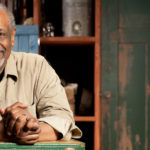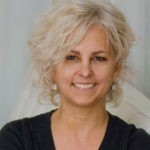It’s not by chance that Joan Bauer’s novels are filled with humor, resilience and hope.
While readers turn page after page immersing themselves in the story, they are probably unaware that Joan relies heavily on personal experience to create her novels. From an emotional childhood to a serious car accident to a personal brush with 9/11, Joan has not only learned how to pick herself up by the boot straps but also how to create main characters who can do the same, with spunk and grace.
Fiction that feels like nonfiction — that’s her secret recipe. Well, that and a cupcake at the end of a hard day.
— An interview by Lori Tracy
I Wanted to be a Stand-Up Comic
You are definitely not an anomaly on your family tree. Tell me about all your writing and storytelling genes.
It’s certainly in the soil, which is great fun. I grew up outside of Chicago in River Forest, Illinois in the 1950s, with a lot of Frank Lloyd Wright architecture around me. Mom was a high school English teacher. My grandmother was a professional storyteller. My aunt was a teacher; my mother-in-law is a teacher at the Univ. of Pennsylvania (she’s 83!) and wrote textbooks for years and years; my sister is a teacher at American University in Washington, D.C. Even my daughter teaches. She is the digital humanities librarian at Brown University in Rhode Island.
You said on TeachingBooks.net that you felt so different from anyone else in your family when you were growing up. How so? What made you different?
I was a bit overweight as a kid in a fairly attractive family. I was more of an introvert. I spent a lot of time creating stories in my head. Then my parents got divorced when I was eight, and my dad and I were very close even though he had an extraordinary amount of problems. So it wasn’t an easy time. It wasn’t an easy time when he was there either. He didn’t come back and visit regularly at all. I think I felt lost sometimes.
Why didn’t you become a teacher like your other family members?
I don’t think I have the energy to do it every day. I really enjoy teaching about books and writing, but to do it every day, I don’t think I have the personality.
How early did you start noticing you had an interest in writing?
I couldn’t tell you that there was a moment. I loved being read to and worked very hard at learning to read. We had a large library in our living room, built-in bookcases on either side, and I just enjoyed being in there. Stories bounced off the walls of our house. Fiction to me always seemed so true. It was based on truth and one of the ways we would try to explain the world.
I also loved going to the library and running my hands along the tops of the books on the shelves.
Libraries really are sensory places. Do you think kids are missing the sensory experience of opening a book and turning the pages now that some are reading books electronically?
I think it’s good to do both. I hope it will never be only this or only that. But having this wonderful place that’s uniquely for reading and the librarians there know everything and where to find it — those kinds of locations are really important. I can remember being upset and going to the library. I still remember where “Harold and the Purple Crayon” was in my library.
Librarians are remarkable people. They’re so warm. When I was writing “Hope Was Here” (2000), I did a lot of research. I was checking out books on surviving leukemia, childhood abandonment, corruption in politics, etc., and the librarian looked at my pile of books and put her hand over mine and said, “You must be having a bad day.” I said, “No, I’m writing a novel.” It was very funny.
You grew up loving comedy and wanted to be a comedienne at one point. Do you find that you can satisfy your comedic appetite with your writing, or is there a piece of you that still wishes you were a comedienne?
I wanted to be a stand-up comic. The Dick Van Dyke Show was one of my absolute favorite shows — Bill Cosby and that whole era, storytelling kinds of comedians. Years ago when I moved to New York, I started a stand-up comedy class, but it was just so dirty. I don’t speak like that, so I just decided it wasn’t for me. But I also discovered I like to go deeper than just a joke and have heartfelt humor, so stories are a good place for me.
When Life Deals You Lemons, Make Squash
You started out writing newspaper and magazine articles. Then you were in a serious car accident and during your recovery you wrote your first novel — “Squashed.” Tell me about that transitional period in your life.
It was certainly devastating in the beginning, but it ended up being a very strengthening experience. I had just signed on to a big talent agency in New York to represent me as a screenwriter, and then the car accident happened. I had such trouble focusing during the recovery, so writing seemed out of the question at that time.
But in the midst of all this, I got an idea of a girl who wanted to grow this huge vegetable in Iowa and I thought, “Good grief, where is this coming from?” But it was the first time ever that I actually heard a character’s voice. Really heard that voice and felt this unreal character becoming real in me. It was amazing. It was like she was saying, “Get up, go to your desk, and sit down. I’ve got something to tell you.”
It took me a year to finish that book, but it changed me. I needed it. Ellie in “Squashed” shook the bars of my cage. It changed the way I think about humor because I laughed and hurt [from the accident recovery] at the same time, yet there was something about that story of overcoming and this girl who had grit and courage. So there was this kind of friendship that developed.
But not once did I actually think, “I’m writing a young adult novel.” I just thought, “I’m writing a novel about a teenager.” I don’t write anything autobiographical, but there’s always a big chunk of me in my books, as a kid and as an adult. I always learn a lesson by the time I get to the end of the book.
So Honestly, What’s It Like?
Are you ever sad when you finish a novel because you no longer are writing about those characters you’ve come so well to know? There must be mixed emotions.
It definitely is sad. Those characters are really a part of you. You’ve spent so much time with them. You give birth, and then all these people come and take it. The marketers come. You have to give your child the keys to the car. There’s not a lot of transition in between.
“What I try to do, honestly, is help kids find the hero they’ve got inside.”
Tell me about the dedication it takes to be a writer. What parts of this profession do you like and dislike?
I love the freedom. I haven’t had to go to an office in several decades. I don’t think I could do it! And yet, you can’t give yourself too much freedom because otherwise you won’t write. When I was a new writer I used to think you’d just write when you feel like it. But if you do that, you don’t write all that often. How many times would you go to school if you only went when you felt like it? The biggest thing I’ve learned is you sit down in front of your computer and write when you feel like writing and when you don’t. A lot of times nothing comes out or it’s lousy, but sometimes when I feel really glum, the sheer act of writing can bring out some really good stuff.
Six out of your 10 novels have received starred reviews (and been in our Compendium publication). Not a bad ratio. What do you think has made your novels so successful among kids and the reviewers?
What I try to do, honestly, is help kids find the hero they’ve got inside. I try to talk about real issues with humor and grace. I do a lot of research before I start because I want the characters to seem real. I create a place where a kid can feel that it’s real. I was at a school last month in New York and an 8th grader asked me, “Other than nonfiction, do you have any fiction books?” I looked at him and said, “Wow. That’s the nicest thing you could say to me.”
I always try to find hope in my novels, but I don’t want to have Disney endings. I try to have surprises come and humor. The humor is a nice frosting on it. If you have a nice lesson within the folds of the story, it doesn’t feel like you’re hitting anybody over the head. My grandmother could make you laugh and cry with the same story. That’s what I’m looking to do, too.
Those are probably the two most common emotions kids experience — crying and laughing — so it makes sense to try and incorporate both in your stories.
You know I never thought about that, but it’s really profound!
Do you have anything you HAVE to do when you write? For example, lucky socks, lucky pencil, Barry Manilow playing in background…..
I write in my office in my house in Brooklyn. The walls are yellow. I have my big Mac computer. I need to have coffee or tea before I start. I tend to write in the mornings, and I need to have it really quiet. The earlier I can start, the better; that works well for me. I marvel at people who can take their laptops and go sit in Starbucks and write, but that’s just not me.
9/11 and a Little Red Pillow
During the 9/11 terrorist attacks, you were in the process of moving from Connecticut to Brooklyn, and your husband was invited to a breakfast at the World Trade Center the day of the attacks but didn’t go because you were moving. Tell me about what you and Evan went through.
I just couldn’t believe what I was seeing. We moved in the night that the candlelight vigils began. Everybody was just in shock, and yet you couldn’t go down the street and buy a newspaper and not have an amazing conversation with a stranger. People needed to talk. So all of a sudden this huge city turned into a small town in some ways. I remember going to see one of my doctors and he came in, shut the door, and talked with me for 45 minutes. The ache of that time was profound.
My husband, the only reason he’s alive today is because we were moving. He was invited to the Windows of the World breakfast. He knew eight people who went to that breakfast and died. By the end of the week, he knew 13 people who died.
My husband and I would phone each other before getting into a subway for about six weeks. I would take a few steps forward and then back, forcing myself to keep going, to just take a few more steps today, do one more thing that I hadn’t tried. At the end of the week or month, I realized I had walked myself out of a lot of that fear.
My studio office overlooked a gorgeous view of the skyline, and there was this huge hole there. I said, “I can’t write here.” One of the first boxes I unpacked, however, had this little red pillow that had “HOPE” on it, from my “Hope Was Here” book. I took my little pillow and hung it in that window that overlooked the skyline. It looked so absurd, and I’d look at this pillow and think, “Spare me. There’s no hope here right now.” But eventually, it started morphing and growing. I realized I can write again. I ended up writing “Stand Tall,” which is one of my favorite books. It talks about war at a different level.
“It’s so important to appeal to the highest part in a kid — call kids to a higher way of living and thinking. I think there’s a responsibility.”
I got a note from a 13-year-old boy in Israel about a year after Sept. 11. He talked about what it’s like to live in a war and how he was afraid to leave his house. And for whatever reason, “Hope Was Here” gave him hope to go outside and live his life. I remember just sitting at my computer reading that and weeping.
That’s really amazing, when you think about the effect, the impact, your writing can have on kids. That has to be a very powerful feeling.
It is a powerful feeling. I’ve received wonderful mail — letters that would break your heart, letters saying “I wish you were my mother” or “I know exactly what it’s like to live with an alcoholic.” We don’t understand sometimes what a story can do as the world gets more complicated, how it can open doors and open places in a heart. I think, too, it’s so important to appeal to the highest part in a kid — call kids to a higher way of living and thinking. I think there’s a responsibility.
Well I guess you really did end up being a teacher after all then.
NOTE: Joan has several 9/11 teaching resources on her website (joanbauer.com).
Sneak Peak Joan Bauer’s new novel due out this Fall
In Joan’s upcoming novel, “Almost Home,” she plunges readers into the world of Sugar Mae Cole, a 12-year-old girl from Missouri who is at the mercy of her parents’ inability to create a loving, stable home environment for her. Her father is an alcoholic and gambler, and has abandoned her. Her mother wants to be a good parent, but is an enabler and refuses to accept that Sugar’s dad is not coming home.
Her one positive influence is Mr. B, her English teacher, who helps her maintain hope that better days are ahead.
Sugar must endure moving, homelessness and foster care; but through it all, she maintains a strong, admirable resilience. Her main therapy? Writing poems. Sugar is brilliant at putting her emotions into words, and it helps her cope with the world around her, as does her new best friend — an adorable puppy named Shush.
Joan: It was quite a physical and emotional experience for me writing this book. Sugar becomes homeless yet she has such resilience. Her mom is challenged; her dad is challenged. Some kids have to keep going no matter what.
Sugar is the second 12-year-old girl I’ve written about, and there’s something intriguing about that age. There’s still that innocence. It was fascinating for me to write, and understand a story through those younger eyes. You just want to give them the best you’ve got. You have to raise the bar higher. I believe they care about the world and they care about their place in the world. I really respect them.
In this book, the father occasionally comes back into his daughter’s life and then leaves again. Is that directly from your own experience with your father?
Yes. Sometimes my father was in good shape, but more than likely he was not in good shape. But unlike Sugar, I had a deep love for my dad because there were good times. I was always looking for role models. I think that has so affected me as a writer, to try and create adult characters in the story who really are adult role models.
What type of research did you do on homelessness before writing this book?
I did a great deal of research. Years ago, my sister and I worked in a homeless shelter, and we’d sleep there with the women. I read and read. I researched foster care programs. I talked to therapists. Yet I also wanted to make sure it wasn’t a grisly story. Someone was telling me that just this year alone (2011) traffic was up 20% in homeless shelters and soup kitchens. This is not just something that happens to other people. What are those teachable moments? I try to pour in the whole issue of resilience and bouncing back. Sugar sure has some opportunities to do that. Also, you don’t have to be homeless to feel homeless. Sometimes no one is paying attention to you, or maybe it’s not a safe environment.
The poems Sugar writes in the book are so genuine. How did you write those? (see sample below)
They just flowed out of me. A lot of those poems are first draft. I think I knew her so well, I could hear the cry of her heart. Sometimes I would take pages of dialogue and throw it away, and a poem would come to me. It was really a fascinating experience — I’ve never had an experience like that before.
A Poem by Sugar from “Almost Home”
How are you doing?
Everybody wants to know.
It’s like there’s a special answer they’re looking for,
Fine — I’m doing fine,
Or pretty good,
Or okay, I’m okay, you don’t have to worry about me.
They should probably worry, though, just a little
Because I’m feeling like I could turn to stone right now
So I would stop feeling.
The stone girl.
You can’t get me.
You can’t hurt me.
You can’t make me go anywhere I don’t want.
Girls don’t wake up saying, I’m turning to stone today.
Normal girls don’t have to do it,
I’m not supposed to do it,
But stone is strong
And it’s hard to break.
Not like a heart — that’s easy to break
And hard to put back together.
So Sweet Words of Wisdom from Sugar
“Are you all right?” the librarian asked me.
“My grandpa died” I said [Sugar].
“Oh, my dear.” She picked up a vase with fresh flowers from the return desk and handed it to me. “These are for you.”
Being this is a library, I wasn’t sure if I had to return them, so I figured I’d better ask.
“They’re for you to keep,” she said.
That’s something coming from a librarian.
Sugar: “I recommend crying in the shower because you can get two things done at once.”
Sugar gives a homeless man her last granola bar. “What people don’t usually think about is this guy had a life before this happened to him. He had a before, like me.”
Sugar: “Sometimes the best thing that can happen to a person is to have a puppy lick your face.”
Joan’s First Published Piece of Writing
Chicago Tribune Magazine, June 3, 1973 “I won second prize in their fruit and vegetable poetry contest.”
Lima Bean Blues
by Joan Bauer
With fork in hand, with tongue in cheek, with eyes projecting hate,
I glower at the lima beans remaining on my plate.
Oh bilious lima, bean obscene, awash in salt and butter,
My stomach turns, my psyche churns with thoughts I dare not utter.
But there they sit, and I must eat, although I feel mistreated.
There’s one thing worse than lima beans: That’s lima beans reheated.
“What was really cool is that in June 2011 I won the Chicago Tribune’s Young Adult Lit Award. I’ve really come full circle!”
Celebrating Life
“My mother’s great gift was knowing how to celebrate life no matter what the circumstances. She passed away a couple years ago. We really hit some tough skids when I was a kid because my dad was a messed-up alcoholic and a gambler. So there were lots of challenges. Celebration was usually through food sitting down at a table together. She would go overboard for our birthdays and holidays to make sure there were celebrations and gifts. We never missed a birthday party, even though there were some years when she had every right to miss one, but she never did. There were times in life when you just sit down with a cupcake or a donut, and you put a candle in it and say, ‘Boy what a rotten day … HOWEVER … [cupcake!]’”
Fun Facts
Joan lives in Brooklyn, New York, with her husband, computer scientist Evan Bauer. She is 60 years old.
Favorite vacation spot: Switzerland
Favorite food: Coconut cake with too much frosting
If you could meet any one person in the world, who would it be?
“Can I pick two? Johann Sebastian Bach: I’d sit in the church while he was playing. He was just a river of extraordinary music. Martin Luther King Jr.: My aunt marched with him. She had her shoes bronzed and put them on her TV set.”
Joan participated in the U.S. State Department’s professional speaker’s program.
“I was the first children’s author that they sent out in 10 years and the first children’s author to go to Kazakhstan. You go all about the country and speak about your work. They call it public diplomacy. It’s kind of showing people a side of America that they maybe hadn’t heard about. It was absolutely one of the biggest thrills of my life. We went all over Kazakhstan and that is the 9th largest country in the world. As a result of my trip there, the State Dept. actually printed ‘Hope Was Here’ in Russian and it was distributed throughout Russia.”






